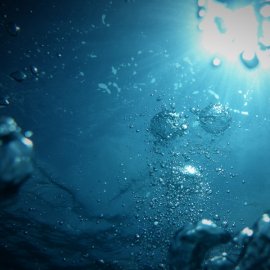The Future of Aquaculture, part four
-
English
-
ListenPause
[intro music] Welcome to World Ocean Radio… I’m Peter Neill, Director of the World Ocean Observatory. Problems with aquaculture technology, specifically containment, waste control, and disease, have been recognized and addressed through with new offshore pens and feeding systems to on-shore locations and closed-circulation design to genomic improvement – each a refinement of what must be an essential response to the decline of available seafood in the wild and the increase in demand for fish products as an alternative, healthy provision of essential nutrition worldwide. Much progress and innovation remain – in aquafeed, for example, the identification of novel ingredients to replace fishmeal, new potential sources to include plant-based proteins from soybeans, insect proteins, and fish oil replacement, and in the production of new vaccines, orally delivered, to increase control of disease and prevent catastrophic loss. None of this is without peril, but consider the alternative: an ocean deprived of sea life not just by overfishing and illegal harvest, but by other invasive technologies in response to comparable excess and destruction on land: uncontrolled plastic pollution, toxic chemicals, acidification of our ocean waters, deep sea mining, and destruction of genetic material unique to the ocean – accumulating to consummate damage and loss of the last great source of human sustenance and solace. We do not seem able to mitigate our behaviors, or adapt them to a disciplined pattern of sustainable consumption. We must invent our way forward. But let’s linger on the word “aquaculture” itself. Water plus Culture, defined as “all the ways of life, including arts, beliefs and institutions of a population, that are passed down from generation to generation.” That is, of course, what is at stake here. The power of water as a universal source of not just body, but also of mind, as a collective force for creativity, values, and community through time. We can attribute to the noun everything from genetics to spiritual beliefs, and we can accept that power as a guiding influence for our lives, an eternal that will nurture us from day to day, year to year, in every place on earth. We live on “Aqua, “ not “Terra,” a planet that is water: like our bodies, mostly water, like our systems, maintained by water, and we are foolish to deny its pervasive significance for every aspect of our being. Thus, aquaculture as a word, as a natural system, as a power for life far more transcendent than a threatening technology by which to grow fish, is an idea to be welcomed, embraced, and used to guide the creativity by which we guide our life—a paradigm that focuses science and technology, laws and operational structures for governance, and values of democracy, equality, equity, and social justice: a society enriched and extended by water, by hydraulic impetus, by waves of generosity, by cycles of good, by expressions of love. Life in a drop. It is as vast, and as minute, as all that. We started these recent four editions of World Ocean Radio confronted with a negative, a loss, a crisis that threatens our ability to feed one another, to which we responded with a technical response with many questions, some answers now, some answers to come. We passed through a process, possibly dangerous, but with faith in best intention and capacity to confront and reduce the risks along the way. The science is at once disconcerting and exhilarating; the prospect optimistic. And we ended on a philosophical crest, a breaking wave of possibility contained in the reality of the ocean, water and philosophy, for the benefit of all our kind. We will discuss these issues, and more, in future editions of World Ocean Radio. [outro music]
In this brief series we have explored technologies, initiatives and other advancements for aquaculture with the power to improve efficiency and safety as a positive contribution to our future food supply and global health. This week represents the fourth and final installment of the series, focusing on the broader view of the word "aquaculture"—Water plus Culture—the universal source and guiding influence for our lives that will nurture and sustain us into the future if we can recognize and protect its significance for every aspect of our being.
About World Ocean Radio
Peter Neill, Director of the World Ocean Observatory and host of World Ocean Radio, provides coverage of a broad spectrum of ocean issues from science and education to advocacy and exemplary projects. World Ocean Radio, a project of the World Ocean Observatory, is a weekly series of five-minute audio essays available for syndicated use at no cost by college and community radio stations worldwide.
World Ocean Radio is produced in association with WERU-FM in Blue Hill, Maine and is distributed by the Public Radio Exchange and the Pacifica Network.
Available for podcast download wherever you listen to your favorites.
Image
Jong Marshes @turnlilp19 Unsplash
- Login to post comments



